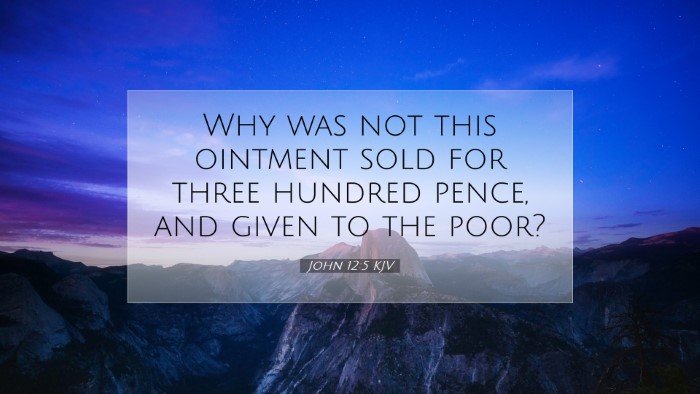Commentary on John 12:5
John 12:5 states: "Why was this ointment not sold for three hundred pence, and given to the poor?" This verse is situated within the context of an anointing scene in Bethany, where Mary, sister of Martha, anoints Jesus with costly ointment. This act triggers a reaction from Judas Iscariot, one of the disciples, who questions the worthiness of such an extravagant display of devotion.
Contextual Analysis
To fully grasp the depth of this passage, one must look at its contextual background. The anointing occurs shortly before the Passover, at a time when Jesus’ ministry was reaching a climax and he was nearing his crucifixion. The emotional and theological heaviness of the moment adds significance to Mary's actions.
Insights from Matthew Henry
Matthew Henry, in his renowned commentary, emphasizes the extravagance of Mary's devotion. He notes that the costly perfume symbolizes her recognition of Jesus' worthiness. Mary displays an act of love, yielding her most valuable possession in honor of Christ, contrasting sharply with Judas' thoughts on monetary value.
Henry also highlights the hypocrisy of Judas. Judas’ concern for the poor is portrayed as a facade, masking his true greed and intent. Henry points out that those who question the devotion of others toward Christ often do so out of selfish motives, and Judas serves as an example of this.
Insights from Albert Barnes
Albert Barnes offers a thorough examination of the historical and cultural implications behind the objection raised by Judas. He articulates that the sum of three hundred pence is equivalent to a significant amount of money—a typical year's wage for a laborer. Judas dives into the area of contractual obligations, emphasizing his perception of financial stewardship even as he internally grapples with greed.
Barnes suggests that Judas' inquiry resonates with a common societal norm—a preference for practicality over spirituality. He mentions the importance of discerning the heart’s motivations when evaluating acts of worship. Many may view acts of worship as wasteful if they do not fit within their own understanding of rationality.
Insights from Adam Clarke
Adam Clarke brings attention to the spiritual significance of Mary’s actions. He proposes that Mary’s anointing of Jesus transcends mere ritualistic practice; it illustrates her deep spiritual insight and willingness to honor Jesus as King. Clarke emphasizes the importance of prioritizing spiritual matters over temporal concerns, arguing that true worship might often seem wasteful in the eyes of the world, yet it holds eternal value.
Moreover, Clarke observes that Judas’ distinction between the value of the ointment and the need for the poor reveals a heart that is divisive and self-serving. Clarke’s commentary encourages believers to avoid the mindset that equates monetary worth with spiritual worth, urging them instead to recognize the immeasurable value of sincere worship.
Theological Reflections
This exchange between Judas and Mary raises several important theological considerations:
- The Nature of True Worship: The heartfelt devotion displayed by Mary prompts one to consider what true worship entails. Are we willing to bring our best to Christ, regardless of societal expectations or perceived practicality?
- Value of Sacrifice: Mary's act serves as a paradigm of worship involving sacrifice. Theologians are called to reflect on the nature of their own sacrifices—is our devotion only expressed in ways that society values?
- Judgment of Intent: As Judas voices his concerns, this passage elucidates God's ability to perceive motives. This serves as a warning against hypocrisy within the faith community and reminds ministers to inspect their own motivations.
Practical Implications
For pastors, students, theologians, and biblical scholars, John 12:5 holds significant practical applications:
- Encouraging Authentic Worship: This passage compels leaders to foster environments where authentic worship, irrespective of monetary value or societal approval, is encouraged and celebrated.
- Teaching on Generosity: There is a need to differentiate between true generosity and self-serving tendencies, challenging congregations to reflect on their sacrificial giving.
- Spiritual Priorities: In a world often defined by material pursuits, this scriptural incident serves as a reminder to align one's heart with God’s priorities—valuing the eternal over the temporal.
Conclusion
John 12:5 encapsulates more than a mere exchange of words; it reflects a deep theological discourse on the nature of worship, sacrifice, and the intrinsic value we place on Christ. By examining the perspectives of Mary and Judas, we are invited to evaluate our understanding of worship and the motivations behind our actions. Each commentator—Henry, Barnes, and Clarke—brings forth insights that collectively challenge and inspire believers to live out a faith that honors Christ above all else.


